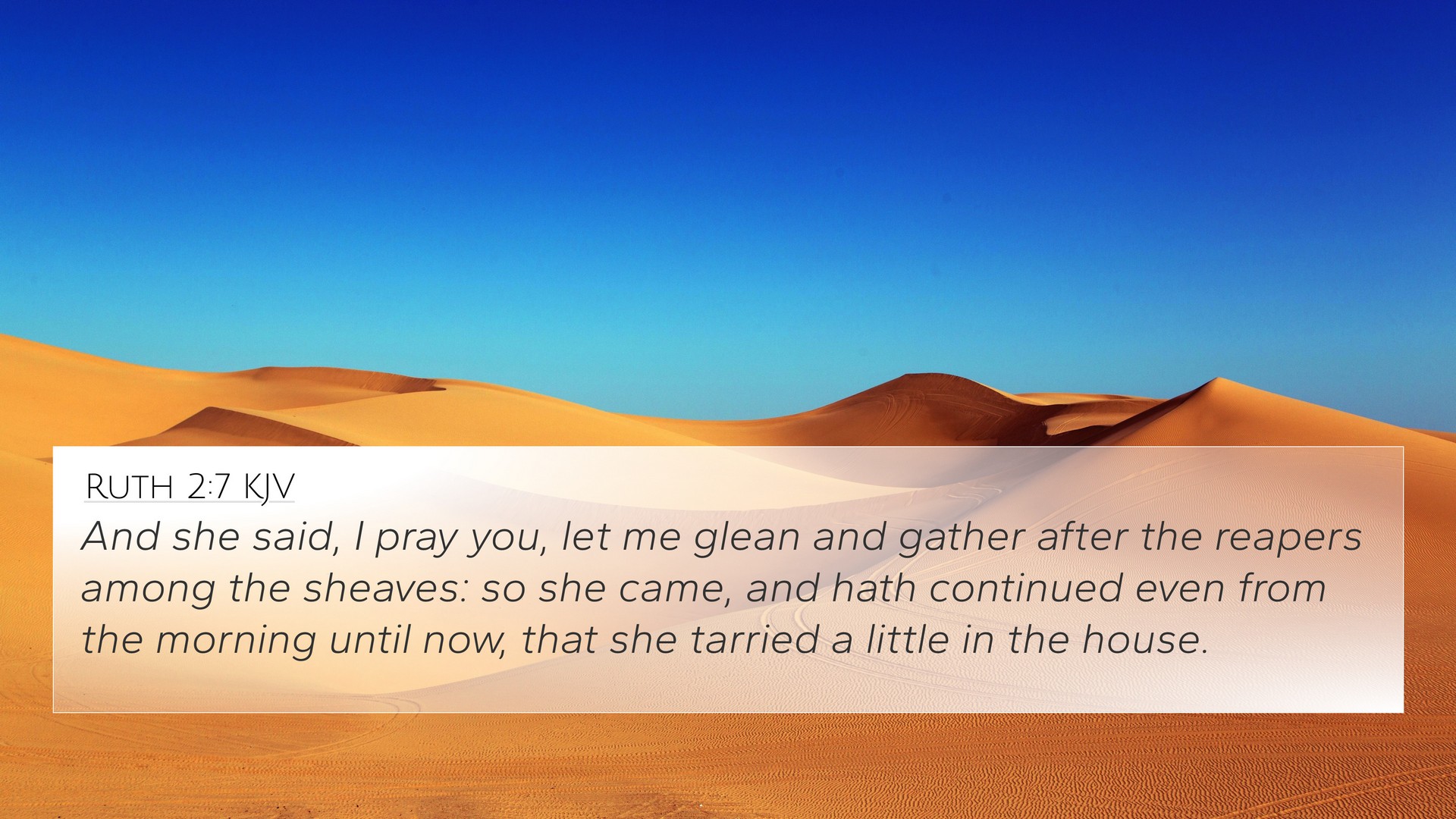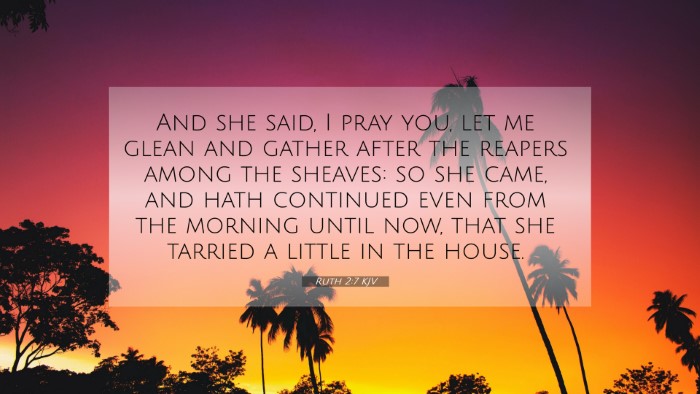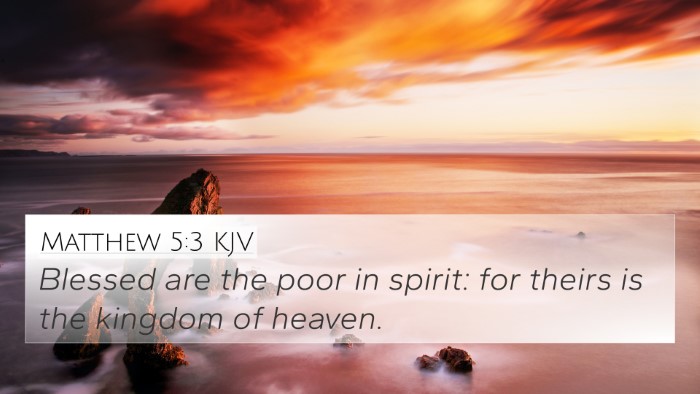Old Testament
Genesis Exodus Leviticus Numbers Deuteronomy Joshua Judges Ruth 1 Samuel 2 Samuel 1 Kings 2 Kings 1 Chronicles 2 Chronicles Ezra Nehemiah Esther Job Psalms Proverbs Ecclesiastes Song of Solomon Isaiah Jeremiah Lamentations Ezekiel Daniel Hosea Joel Amos Obadiah Jonah Micah Nahum Habakkuk Zephaniah Haggai Zechariah MalachiRuth 2:7 Similar Verses
Ruth 2:7 Cross References
And she said, I pray you, let me glean and gather after the reapers among the sheaves: so she came, and hath continued even from the morning until now, that she tarried a little in the house.
Ruth 2:7 Cross Reference Verses
This section features a detailed cross-reference designed to enrich your understanding of the Scriptures. Below, you will find carefully selected verses that echo the themes and teachings related to Ruth 2:7 KJV. Click on any image to explore detailed analyses of related Bible verses and uncover deeper theological insights.

Proverbs 15:33 (KJV) »
The fear of the LORD is the instruction of wisdom; and before honour is humility.

Proverbs 13:4 (KJV) »
The soul of the sluggard desireth, and hath nothing: but the soul of the diligent shall be made fat.
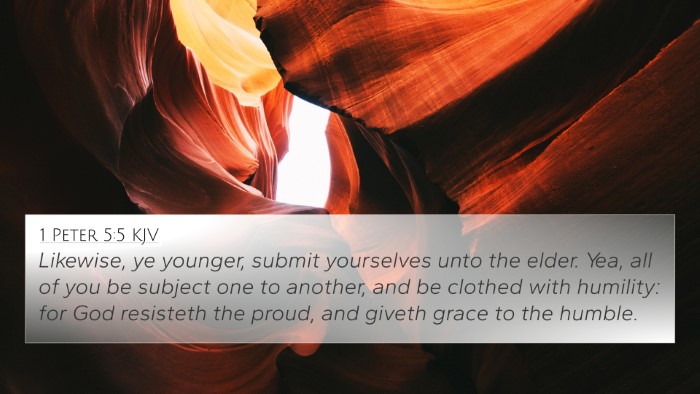
1 Peter 5:5 (KJV) »
Likewise, ye younger, submit yourselves unto the elder. Yea, all of you be subject one to another, and be clothed with humility: for God resisteth the proud, and giveth grace to the humble.

Ecclesiastes 9:10 (KJV) »
Whatsoever thy hand findeth to do, do it with thy might; for there is no work, nor device, nor knowledge, nor wisdom, in the grave, whither thou goest.
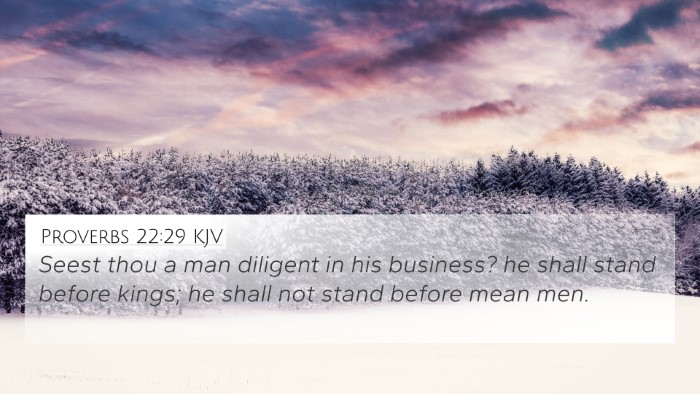
Proverbs 22:29 (KJV) »
Seest thou a man diligent in his business? he shall stand before kings; he shall not stand before mean men.
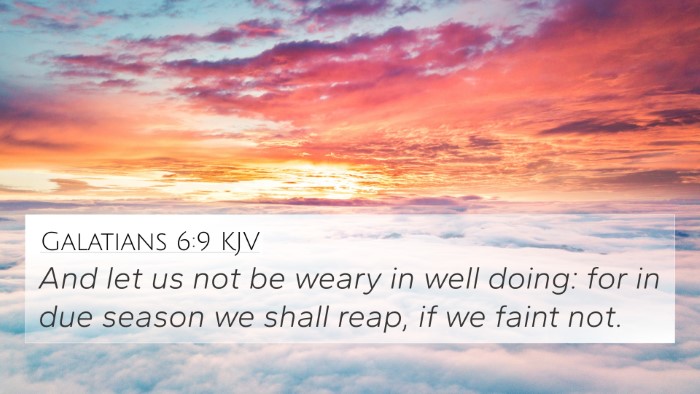
Galatians 6:9 (KJV) »
And let us not be weary in well doing: for in due season we shall reap, if we faint not.
Ruth 2:7 Verse Analysis and Similar Verses
Ruth 2:7 states, "And she said, I pray you, let me glean and gather after the reapers among the sheaves: so she came, and hath continued even from the morning until now, that she tarried a little in the house." This verse is part of the narrative in which Ruth, a Moabite widow, seeks permission to glean in the fields of Boaz.
Meaning and Interpretation
Matthew Henry explains that Ruth’s humble request to glean is indicative of her hard work and dedication. Ruth's perseverance in the face of adversity demonstrates her loyalty to Naomi and her commitment to providing for their needs. This verse captures the essence of Ruth's character as industrious and faithful, traits commendable in both biblical and contemporary contexts.
Albert Barnes emphasizes the significance of gleaning, noting that it was a provision made for the poor within the Mosaic Law that allowed them to gather leftover grain from the harvest. Ruth's request demonstrates the application of this law and reflects her reliance on God's providence. Barnes also highlights how Ruth's diligent work serves as a foreshadowing of future blessings from God.
Adam Clarke contributes by noting the cultural importance of gathering grain in this manner, as it illustrated community support and care for the needy. Clarke further points out that Ruth's actions exhibited humility and a willingness to work tirelessly, drawing a connection to the broader theme of hard work leading to divine reward.
Cross-References and Connections
This verse connects to several critical themes and scriptures within the Bible. Here are some relevant cross-references:
- Leviticus 19:9-10 - God’s command to leave the corners of fields for the poor, establishing the foundation for gleaning.
- Deuteronomy 24:19 - Illustrates the same principle of leaving behind harvest for the foreigner, widow, and orphan.
- Proverbs 10:4 - Speaks to the importance of diligence and hard work, correlating with Ruth’s efforts to glean.
- Galatians 6:9 - Encouragement not to grow weary in doing good, which resonates with Ruth’s persistent effort.
- James 1:27 - Reflects the call for believers to care for the needy, aligning with Ruth’s actions.
- Matthew 5:16 - Calls to let one’s good works shine, mirroring Ruth's faithful labor for Naomi.
- Philippians 4:19 - Reminds believers that God will meet their needs, echoing the theme of divine provision evident in Ruth’s narrative.
Thematic Bible Verse Connections
This exploration of Ruth 2:7 allows for deeper understanding through thematic connections, such as:
- The Role of Women in the Bible - Ruth exemplifies strong feminine virtue and resilience.
- God's Providence - Ruth’s gleaning reflects God's care for the marginalized.
- Faithfulness in Adversity - Highlights character traits that lead to blessings.
- Community Support and Social Justice - Emphasizes the biblical call to support the less fortunate through communal standards.
How to Study Verse Connections
For anyone engaging in a deeper study of Ruth 2:7 and its cross-references, consider the following methods:
- Utilize a Bible concordance for referencing terms related to gleaning and provision.
- Engage in cross-reference Bible study using specialized tools.
- Explore thematic Bible verse connections to gather a broader understanding of scriptural context.
- Employ resources or guides for comprehensive exploration of biblical cross-references.
Conclusion
In summary, Ruth 2:7 serves not just as a narrative detail but as a vivid illustration of faith, work, and God's providence. By studying this verse and its connections to other scriptures, believers can gain insight into the importance of diligence, the value of community support, and the overarching theme of God’s care for the needy.
